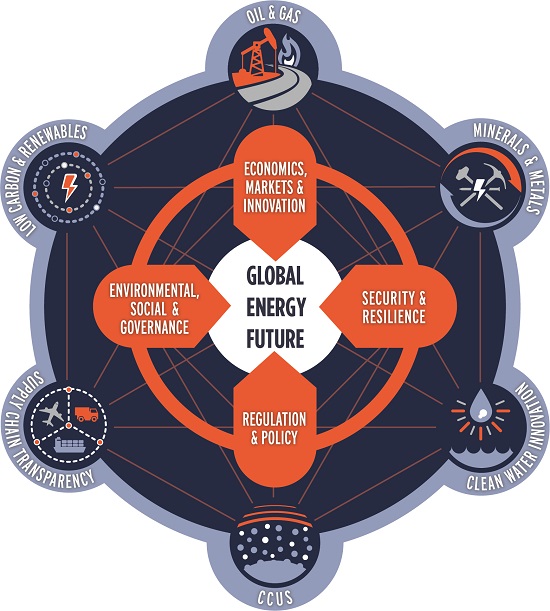Global Energy Future Initiative
Connecting energy innovators,
industry leaders and policy makers
to advance scientific, data-driven solutions
for the global energy future
The Future of Energy is Now, at Mines
Join the Mines Global Energy Future Initiative as we bring together global energy thought leaders and world-class Colorado School of Mines faculty through research, education, workshops, seminars and outreach.

Why Mines Global Energy Future Initiative?
Governments and industry around the globe are pursuing increasingly ambitious initiatives to reduce greenhouse gas emissions and diversify their energy portfolios, all while the world is facing significant growth in energy demand from emerging and developing economies. On these complex issues, Mines has a unique combination of expertise with the depth to meet the energy challenges head on. Mines has an exceptional track record of solving tough scientific and engineering problems across the gamut of energy and environmental fields. The university enjoys a hard-earned reputation as an unbiased problem-solver in disciplines often at odds in the energy-environment discussion; the university tagline, “Earth, Energy, Environment” is an accurate reflection of our expansive and growing purview.
With partners from academia, industry, government, and civil society galvanized by Mines’ uniquely comprehensive expertise, we’re developing energy solutions that will shape decision-making, now and in the decades to come.
Impactful Hubs

Low Carbon and Renewable Energy
Developing renewable, secure, resilient, and adaptive energy infrastructure that fosters economic growth while reducing environmental impact
Carbon Capture Utilization & Storage (CCUS)
Multidisciplinary approach to scientific, engineering and policy research on net zero emissions technological innovations
Clean Water Innovations
Role of technology innovation in reimagining global water in the future energy system
Minerals & Metals
Finding solutions to meet the minerals and metals needs to create our future energy system, including sustainable mining practices; technological innovations in mining; and the role of markets, economics and policy
Oil and Gas
Designing interdisciplinary research focused on the science, engineering and policy of oil and gas in the net-zero energy future
Supply Chain Transparency
Understanding how the future energy system will impact the global supply chain and the associated effects on markets, communities and the environment
Latest News
US ratification of the ocean treaty will unlock deep sea mining 4/2/2024
US ratification of the ocean treaty will unlock deep sea mining
Payne Institute Fellow Alex Gilbert and Director Morgan Bazilian write about how hundreds of former political and military leaders are calling for the US Senate to ratify the UN Convention on the Law of the Sea (UNCLOS), the impetus being to open up deep sea mining to supply critical minerals needed for clean energy and military technologies. Deep seabed resources include highly valued minerals such as cobalt, nickel, and rare earths. April 2, 2024.
Panel of lawmakers considers whether carbon capture holds future in Colorado 4/1/2024
Panel of lawmakers considers whether carbon capture holds future in Colorado
Payne Institute CCUS Program Manager Anna Littlefield contributed to this article about how as Colorado aims to achieve 100% net-zero greenhouse-gas emissions by 2050, leaders of key state agencies argue that they can’t meet that goal without employing carbon-capture-and-sequestration techniques in hard-to-decarbonize sectors. Ensuring the state has tools to allow and regulate such operations as fossil-fuel usage continues for the foreseeable future is a “strategic step to expediting the process.” April 1, 2024.
Hydropower production took a hit in 2023 3/28/2024
Hydropower production took a hit in 2023
Payne Institute Faculty Fellow Adrienne Marshall is on this podcast discussing how U.S. hydropower production was down 11% from the year before and dipped to a 22-year low last year, according to the federal Energy Information Administration. To make up for the hydro deficit, the U.S. bought natural gas power, which emits more carbon than hydro does, as well as some solar energy. March 28, 2024.
New Method for Tracking Down Methane Emissions on Oil and Gas Sites 3/27/2024
New Method for Tracking Down Methane Emissions on Oil and Gas Sites
Payne Institute Student Researcher William Daniels, Faculty Fellow Dorit Hammerling, and Director Morgan Bazilian write about how reducing methane emissions is a key component of short-term climate action. Empirical data and transparent models are key pillars of emission reduction efforts. Payne Institute researchers William Daniels, Meng Jia, and Dorit Hammerling have developed a completely open-source analytical framework for detecting single-source methane emissions, determining the source location, and estimating an emission rate using data from continuous monitoring systems (CMS). March 27, 2024.
Energy Dept. Awards $6 Billion for Green Steel, Cement and Even Macaroni Factories 3/25/2024
Energy Dept. Awards $6 Billion for Green Steel, Cement and Even Macaroni Factories
Payne Institute Director Morgan Bazilian contributes to this article about how industries produce 25 percent of America’s planet-warming emissions but so far have proved very hard to clean up. The Biden administration is trying by with plans to spend up to $6 billion on new technologies to cut carbon dioxide emissions from heavy industries like steel, cement, chemicals and aluminum, which are all enormous contributors to global warming but which have so far been incredibly difficult to clean up. March 25, 2024.
Why Mines?
Since 1874, Mines has been a pioneer at the frontiers of science and engineering, from locating and recovering earth resources, to energy production, to environmental stewardship.
Over time, Mines’ expertise expanded to meet the changing needs of industry and society, playing key roles in the growth of the global energy and natural resource industries. We are now positioned to leverage that deep expertise through a data-driven approach to informing the global energy future, in collaboration with academia, industry, government and civil society partners.
Leadership
John Bradford
Vice President for Global Initiatives
Morgan Bazilian
Director, Payne Institute for Public Policy
For more information about the Mines Global Energy Future Initiative at the Colorado School of Mines, please contact our Deputy Director, Gregory Clough, at gclough@mines.edu.
Mines@150
As Colorado School of Mines approaches our sesquicentennial, we are ideally suited to lead this initiative. Our bold and ambitious MINES@150 strategic plan builds on the exceptional legacy of our PAST, the ways we impact the PRESENT and the POSSIBILITIES of our global energy future.












